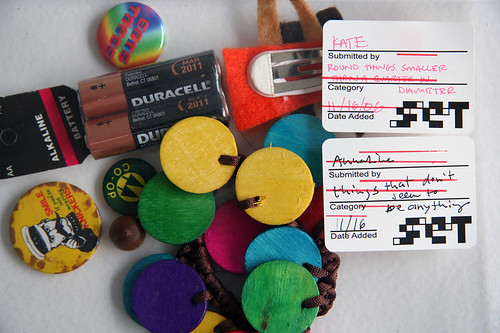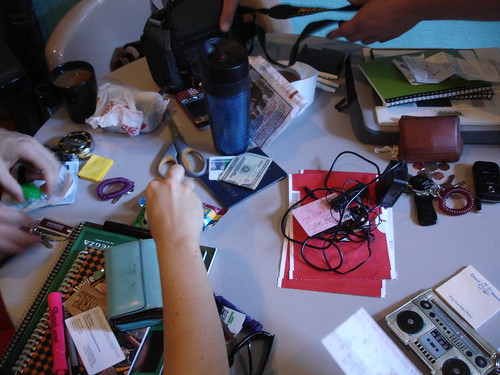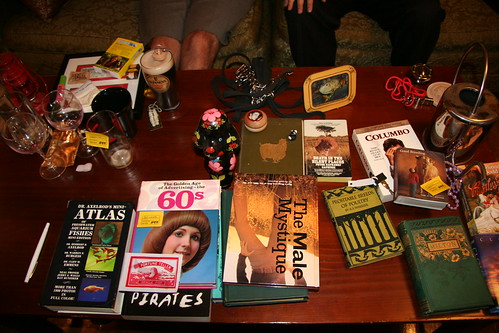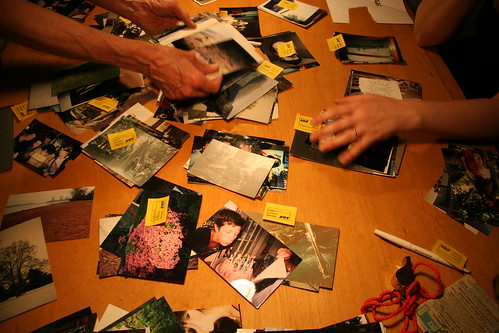SET / Erik Carver & Marisa Jahn
Image by AGoK
"In the grand tradition of generals and surrealists, we have been playing games. People learn things better through the open-ended, empathetic participation in knowledge-making that games allow. Just dispensing information to people-- though at times enlightening-- can also encourage apathy or forgetfulness. Lately, we have been using games to critically examine the dynamics and assumptions of larger social givens.Our new game SET was inspired by toy collectors, tourists, and museum curators. Throughout the game, players "play" by intervening and reorganizing existing groups of objects, thus questioning categories by constructing and redrawing them. In foregrounding the player's relation to the categories, SET explores the value of one's authorship in the production of knowledge. While games often risk normalizing power relationships by setting social roles and rules in stone, we have tried here to do just the opposite."
People learn things better through the open-ended, empathetic participation in knowledge-making that games allow. Just dispensing information to people-- though at times enlightening-- can also encourage apathy or forgetfulness. A project developed by Erik Carver and Marisa Jahn, SET is a game that critically examines the dynamics and assumptions of larger social givens. It's a game inspired by toy collectors, tourists, and museum curators. Throughout the game, players "play" by intervening and reorganizing existing groups of objects, thus questioning categories by constructing and redrawing them. In foregrounding the player's relation to the categories, SET explores the value of one's authorship in the production of knowledge. While games often risk normalizing power relationships by setting social roles and rules in stone, SET tries to do just the opposite.
--
Erik Carver
Erik Carver is an architect and artist. He is a founder of the Institute for Advanced Architecture (advancedarchitecture.org)-- an organization dedicated to advancing architecture through research, exchange, and exhibition-- as well as the Common Room exhibition space (common-room.net) and the interdisciplinary art group Seru. He lives in Brooklyn and teaches architecture at Rensselaer Polytechnic Institute.
Erik has worked for the firms of Diller+Scofidio, Laura Kurgan, and Lyn Rice before starting his own practice. These designs have included a student center renovation, an art museum, apartment renovations, a vacation home, exhibitions, a performance space/bar, an expo pavilion, schools, offices and an interpretation center.
His work has appeared in Volume magazine, Art in America, and Nature, and he has shown work and lectured at venues including Exit Art, the Ise Foundation, and Columbia's Neiman Gallery, and the Storefront for Art and Architecture (NYC), The Institute of Contemporary Art (Philadelphia), CAVS (MIT), Basekamp (Philadelphia), the Contemporary Art Center (North Adams, MA), and Pond (San Francisco).
Marisa Jahn
Of Ecuadorian and Chinese descent, Marisa Jahn is an artist whose work explores, constructs, and intervenes natural and social systems. In 2000, Jahn has co-founded Pond: art, activism, and ideas (www.mucketymuck.org), a non-profit organization dedicated to showcasing experimental art. Jahn has presented and exhibited work in museums, galleries, and spaces at venues such as The Institute of Contemporary Art (Philadelphia), the Asian Art Museum of San Francisco, Yerba Buena Center for the Arts (San Francisco), ISEA/Zero One 06/08 (San Jose, CA), MoKS (Estonia), the Moore Space (Miami), the Museum of Contemporary Art (North Miami), in galleries and public places in Tokyo, Honduras, Estonia, Turkey, North America, and Taiwan. Jahn's work has been reviewed in Art in America, Frieze, Punk Planet, Clamor, San Francisco Chronicle, the Fader, Artweek, Metropolis, the Discovery Channel, and Canadian Broadcasting Corporation (CBC). She has received awards and grants such as the Robert & Colleen Haas Scholarship, MIT Department of Architecture Fellowship (2005-8), CEC Artslink, and is an artist in residence at the MIT Media Lab (2007-9) and at the Headlands Center for the Arts (2008). She received her BA from UC Berkeley and an MS from MIT's Visual Arts Program. She lives between Boston and New York, where she functions as the Immediator of art-activist campaigns for The Church of Stop Shopping/Reverend Billy. www.marisajahn.com, www.mucketymuck.org
SET / Erik Carver & Marisa Jahn
Image by AGoK
"In the grand tradition of generals and surrealists, we have been playing games. People learn things better through the open-ended, empathetic participation in knowledge-making that games allow. Just dispensing information to people-- though at times enlightening-- can also encourage apathy or forgetfulness. Lately, we have been using games to critically examine the dynamics and assumptions of larger social givens.Our new game SET was inspired by toy collectors, tourists, and museum curators. Throughout the game, players "play" by intervening and reorganizing existing groups of objects, thus questioning categories by constructing and redrawing them. In foregrounding the player's relation to the categories, SET explores the value of one's authorship in the production of knowledge. While games often risk normalizing power relationships by setting social roles and rules in stone, we have tried here to do just the opposite."
People learn things better through the open-ended, empathetic participation in knowledge-making that games allow. Just dispensing information to people-- though at times enlightening-- can also encourage apathy or forgetfulness. A project developed by Erik Carver and Marisa Jahn, SET is a game that critically examines the dynamics and assumptions of larger social givens. It's a game inspired by toy collectors, tourists, and museum curators. Throughout the game, players "play" by intervening and reorganizing existing groups of objects, thus questioning categories by constructing and redrawing them. In foregrounding the player's relation to the categories, SET explores the value of one's authorship in the production of knowledge. While games often risk normalizing power relationships by setting social roles and rules in stone, SET tries to do just the opposite.
--
Erik Carver
Erik Carver is an architect and artist. He is a founder of the Institute for Advanced Architecture (advancedarchitecture.org)-- an organization dedicated to advancing architecture through research, exchange, and exhibition-- as well as the Common Room exhibition space (common-room.net) and the interdisciplinary art group Seru. He lives in Brooklyn and teaches architecture at Rensselaer Polytechnic Institute.
Erik has worked for the firms of Diller+Scofidio, Laura Kurgan, and Lyn Rice before starting his own practice. These designs have included a student center renovation, an art museum, apartment renovations, a vacation home, exhibitions, a performance space/bar, an expo pavilion, schools, offices and an interpretation center.
His work has appeared in Volume magazine, Art in America, and Nature, and he has shown work and lectured at venues including Exit Art, the Ise Foundation, and Columbia's Neiman Gallery, and the Storefront for Art and Architecture (NYC), The Institute of Contemporary Art (Philadelphia), CAVS (MIT), Basekamp (Philadelphia), the Contemporary Art Center (North Adams, MA), and Pond (San Francisco).
Marisa Jahn
Of Ecuadorian and Chinese descent, Marisa Jahn is an artist whose work explores, constructs, and intervenes natural and social systems. In 2000, Jahn has co-founded Pond: art, activism, and ideas (www.mucketymuck.org), a non-profit organization dedicated to showcasing experimental art. Jahn has presented and exhibited work in museums, galleries, and spaces at venues such as The Institute of Contemporary Art (Philadelphia), the Asian Art Museum of San Francisco, Yerba Buena Center for the Arts (San Francisco), ISEA/Zero One 06/08 (San Jose, CA), MoKS (Estonia), the Moore Space (Miami), the Museum of Contemporary Art (North Miami), in galleries and public places in Tokyo, Honduras, Estonia, Turkey, North America, and Taiwan. Jahn's work has been reviewed in Art in America, Frieze, Punk Planet, Clamor, San Francisco Chronicle, the Fader, Artweek, Metropolis, the Discovery Channel, and Canadian Broadcasting Corporation (CBC). She has received awards and grants such as the Robert & Colleen Haas Scholarship, MIT Department of Architecture Fellowship (2005-8), CEC Artslink, and is an artist in residence at the MIT Media Lab (2007-9) and at the Headlands Center for the Arts (2008). She received her BA from UC Berkeley and an MS from MIT's Visual Arts Program. She lives between Boston and New York, where she functions as the Immediator of art-activist campaigns for The Church of Stop Shopping/Reverend Billy. www.marisajahn.com, www.mucketymuck.org
SET / Erik Carver & Marisa Jahn
Image by AGoK
"In the grand tradition of generals and surrealists, we have been playing games. People learn things better through the open-ended, empathetic participation in knowledge-making that games allow. Just dispensing information to people-- though at times enlightening-- can also encourage apathy or forgetfulness. Lately, we have been using games to critically examine the dynamics and assumptions of larger social givens.Our new game SET was inspired by toy collectors, tourists, and museum curators. Throughout the game, players "play" by intervening and reorganizing existing groups of objects, thus questioning categories by constructing and redrawing them. In foregrounding the player's relation to the categories, SET explores the value of one's authorship in the production of knowledge. While games often risk normalizing power relationships by setting social roles and rules in stone, we have tried here to do just the opposite."
People learn things better through the open-ended, empathetic participation in knowledge-making that games allow. Just dispensing information to people-- though at times enlightening-- can also encourage apathy or forgetfulness. A project developed by Erik Carver and Marisa Jahn, SET is a game that critically examines the dynamics and assumptions of larger social givens. It's a game inspired by toy collectors, tourists, and museum curators. Throughout the game, players "play" by intervening and reorganizing existing groups of objects, thus questioning categories by constructing and redrawing them. In foregrounding the player's relation to the categories, SET explores the value of one's authorship in the production of knowledge. While games often risk normalizing power relationships by setting social roles and rules in stone, SET tries to do just the opposite.
--
Erik Carver
Erik Carver is an architect and artist. He is a founder of the Institute for Advanced Architecture (advancedarchitecture.org)-- an organization dedicated to advancing architecture through research, exchange, and exhibition-- as well as the Common Room exhibition space (common-room.net) and the interdisciplinary art group Seru. He lives in Brooklyn and teaches architecture at Rensselaer Polytechnic Institute.
Erik has worked for the firms of Diller+Scofidio, Laura Kurgan, and Lyn Rice before starting his own practice. These designs have included a student center renovation, an art museum, apartment renovations, a vacation home, exhibitions, a performance space/bar, an expo pavilion, schools, offices and an interpretation center.
His work has appeared in Volume magazine, Art in America, and Nature, and he has shown work and lectured at venues including Exit Art, the Ise Foundation, and Columbia's Neiman Gallery, and the Storefront for Art and Architecture (NYC), The Institute of Contemporary Art (Philadelphia), CAVS (MIT), Basekamp (Philadelphia), the Contemporary Art Center (North Adams, MA), and Pond (San Francisco).
Marisa Jahn
Of Ecuadorian and Chinese descent, Marisa Jahn is an artist whose work explores, constructs, and intervenes natural and social systems. In 2000, Jahn has co-founded Pond: art, activism, and ideas (www.mucketymuck.org), a non-profit organization dedicated to showcasing experimental art. Jahn has presented and exhibited work in museums, galleries, and spaces at venues such as The Institute of Contemporary Art (Philadelphia), the Asian Art Museum of San Francisco, Yerba Buena Center for the Arts (San Francisco), ISEA/Zero One 06/08 (San Jose, CA), MoKS (Estonia), the Moore Space (Miami), the Museum of Contemporary Art (North Miami), in galleries and public places in Tokyo, Honduras, Estonia, Turkey, North America, and Taiwan. Jahn's work has been reviewed in Art in America, Frieze, Punk Planet, Clamor, San Francisco Chronicle, the Fader, Artweek, Metropolis, the Discovery Channel, and Canadian Broadcasting Corporation (CBC). She has received awards and grants such as the Robert & Colleen Haas Scholarship, MIT Department of Architecture Fellowship (2005-8), CEC Artslink, and is an artist in residence at the MIT Media Lab (2007-9) and at the Headlands Center for the Arts (2008). She received her BA from UC Berkeley and an MS from MIT's Visual Arts Program. She lives between Boston and New York, where she functions as the Immediator of art-activist campaigns for The Church of Stop Shopping/Reverend Billy. www.marisajahn.com, www.mucketymuck.org
SET / Erik Carver & Marisa Jahn
Image by AGoK
"In the grand tradition of generals and surrealists, we have been playing games. People learn things better through the open-ended, empathetic participation in knowledge-making that games allow. Just dispensing information to people-- though at times enlightening-- can also encourage apathy or forgetfulness. Lately, we have been using games to critically examine the dynamics and assumptions of larger social givens.Our new game SET was inspired by toy collectors, tourists, and museum curators. Throughout the game, players "play" by intervening and reorganizing existing groups of objects, thus questioning categories by constructing and redrawing them. In foregrounding the player's relation to the categories, SET explores the value of one's authorship in the production of knowledge. While games often risk normalizing power relationships by setting social roles and rules in stone, we have tried here to do just the opposite."
People learn things better through the open-ended, empathetic participation in knowledge-making that games allow. Just dispensing information to people-- though at times enlightening-- can also encourage apathy or forgetfulness. A project developed by Erik Carver and Marisa Jahn, SET is a game that critically examines the dynamics and assumptions of larger social givens. It's a game inspired by toy collectors, tourists, and museum curators. Throughout the game, players "play" by intervening and reorganizing existing groups of objects, thus questioning categories by constructing and redrawing them. In foregrounding the player's relation to the categories, SET explores the value of one's authorship in the production of knowledge. While games often risk normalizing power relationships by setting social roles and rules in stone, SET tries to do just the opposite.
--
Erik Carver
Erik Carver is an architect and artist. He is a founder of the Institute for Advanced Architecture (advancedarchitecture.org)-- an organization dedicated to advancing architecture through research, exchange, and exhibition-- as well as the Common Room exhibition space (common-room.net) and the interdisciplinary art group Seru. He lives in Brooklyn and teaches architecture at Rensselaer Polytechnic Institute.
Erik has worked for the firms of Diller+Scofidio, Laura Kurgan, and Lyn Rice before starting his own practice. These designs have included a student center renovation, an art museum, apartment renovations, a vacation home, exhibitions, a performance space/bar, an expo pavilion, schools, offices and an interpretation center.
His work has appeared in Volume magazine, Art in America, and Nature, and he has shown work and lectured at venues including Exit Art, the Ise Foundation, and Columbia's Neiman Gallery, and the Storefront for Art and Architecture (NYC), The Institute of Contemporary Art (Philadelphia), CAVS (MIT), Basekamp (Philadelphia), the Contemporary Art Center (North Adams, MA), and Pond (San Francisco).
Marisa Jahn
Of Ecuadorian and Chinese descent, Marisa Jahn is an artist whose work explores, constructs, and intervenes natural and social systems. In 2000, Jahn has co-founded Pond: art, activism, and ideas (www.mucketymuck.org), a non-profit organization dedicated to showcasing experimental art. Jahn has presented and exhibited work in museums, galleries, and spaces at venues such as The Institute of Contemporary Art (Philadelphia), the Asian Art Museum of San Francisco, Yerba Buena Center for the Arts (San Francisco), ISEA/Zero One 06/08 (San Jose, CA), MoKS (Estonia), the Moore Space (Miami), the Museum of Contemporary Art (North Miami), in galleries and public places in Tokyo, Honduras, Estonia, Turkey, North America, and Taiwan. Jahn's work has been reviewed in Art in America, Frieze, Punk Planet, Clamor, San Francisco Chronicle, the Fader, Artweek, Metropolis, the Discovery Channel, and Canadian Broadcasting Corporation (CBC). She has received awards and grants such as the Robert & Colleen Haas Scholarship, MIT Department of Architecture Fellowship (2005-8), CEC Artslink, and is an artist in residence at the MIT Media Lab (2007-9) and at the Headlands Center for the Arts (2008). She received her BA from UC Berkeley and an MS from MIT's Visual Arts Program. She lives between Boston and New York, where she functions as the Immediator of art-activist campaigns for The Church of Stop Shopping/Reverend Billy. www.marisajahn.com, www.mucketymuck.org
SET / Erik Carver & Marisa Jahn
Image by AGoK
"In the grand tradition of generals and surrealists, we have been playing games. People learn things better through the open-ended, empathetic participation in knowledge-making that games allow. Just dispensing information to people-- though at times enlightening-- can also encourage apathy or forgetfulness. Lately, we have been using games to critically examine the dynamics and assumptions of larger social givens.Our new game SET was inspired by toy collectors, tourists, and museum curators. Throughout the game, players "play" by intervening and reorganizing existing groups of objects, thus questioning categories by constructing and redrawing them. In foregrounding the player's relation to the categories, SET explores the value of one's authorship in the production of knowledge. While games often risk normalizing power relationships by setting social roles and rules in stone, we have tried here to do just the opposite."
People learn things better through the open-ended, empathetic participation in knowledge-making that games allow. Just dispensing information to people-- though at times enlightening-- can also encourage apathy or forgetfulness. A project developed by Erik Carver and Marisa Jahn, SET is a game that critically examines the dynamics and assumptions of larger social givens. It's a game inspired by toy collectors, tourists, and museum curators. Throughout the game, players "play" by intervening and reorganizing existing groups of objects, thus questioning categories by constructing and redrawing them. In foregrounding the player's relation to the categories, SET explores the value of one's authorship in the production of knowledge. While games often risk normalizing power relationships by setting social roles and rules in stone, SET tries to do just the opposite.
--
Erik Carver
Erik Carver is an architect and artist. He is a founder of the Institute for Advanced Architecture (advancedarchitecture.org)-- an organization dedicated to advancing architecture through research, exchange, and exhibition-- as well as the Common Room exhibition space (common-room.net) and the interdisciplinary art group Seru. He lives in Brooklyn and teaches architecture at Rensselaer Polytechnic Institute.
Erik has worked for the firms of Diller+Scofidio, Laura Kurgan, and Lyn Rice before starting his own practice. These designs have included a student center renovation, an art museum, apartment renovations, a vacation home, exhibitions, a performance space/bar, an expo pavilion, schools, offices and an interpretation center.
His work has appeared in Volume magazine, Art in America, and Nature, and he has shown work and lectured at venues including Exit Art, the Ise Foundation, and Columbia's Neiman Gallery, and the Storefront for Art and Architecture (NYC), The Institute of Contemporary Art (Philadelphia), CAVS (MIT), Basekamp (Philadelphia), the Contemporary Art Center (North Adams, MA), and Pond (San Francisco).
Marisa Jahn
Of Ecuadorian and Chinese descent, Marisa Jahn is an artist whose work explores, constructs, and intervenes natural and social systems. In 2000, Jahn has co-founded Pond: art, activism, and ideas (www.mucketymuck.org), a non-profit organization dedicated to showcasing experimental art. Jahn has presented and exhibited work in museums, galleries, and spaces at venues such as The Institute of Contemporary Art (Philadelphia), the Asian Art Museum of San Francisco, Yerba Buena Center for the Arts (San Francisco), ISEA/Zero One 06/08 (San Jose, CA), MoKS (Estonia), the Moore Space (Miami), the Museum of Contemporary Art (North Miami), in galleries and public places in Tokyo, Honduras, Estonia, Turkey, North America, and Taiwan. Jahn's work has been reviewed in Art in America, Frieze, Punk Planet, Clamor, San Francisco Chronicle, the Fader, Artweek, Metropolis, the Discovery Channel, and Canadian Broadcasting Corporation (CBC). She has received awards and grants such as the Robert & Colleen Haas Scholarship, MIT Department of Architecture Fellowship (2005-8), CEC Artslink, and is an artist in residence at the MIT Media Lab (2007-9) and at the Headlands Center for the Arts (2008). She received her BA from UC Berkeley and an MS from MIT's Visual Arts Program. She lives between Boston and New York, where she functions as the Immediator of art-activist campaigns for The Church of Stop Shopping/Reverend Billy. www.marisajahn.com, www.mucketymuck.org
No comments:
Post a Comment